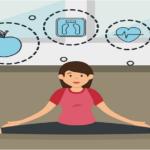
Since ancient times, keeping a journal has been a common hobby, with everyone from famous authors to regular people using it to keep track of their ideas, emotions, and experiences. But did you know that keeping a journal can also have significant advantages for your mental health? That’s right, journaling your thoughts for just a few minutes each day can help you feel better emotionally.
The various advantages of journaling for mental health will be covered in this article, along with advice on how to get started. Journaling can be an effective method for elevating your mood and enhancing your general quality of life, regardless of whether you’re dealing with stress, anxiety, depression, or are just looking for a creative outlet. So let’s enter into the realm of journaling with a pen and paper (or a laptop)!
Journaling’s Positive Effects on Mental Health
Numerous advantages of journaling for mental health have been demonstrated, including better mood and emotional wellbeing, diminished stress and anxiety, increased self-awareness and mindfulness, improved creativity and problem-solving abilities, improved memory and cognitive processing, and even a boosted immune system and physical health. These assertions are supported by research and scientific evidence, which demonstrates that journaling can have a discernible effect on mental health outcomes. Journaling is a potent tool for enhancing both your mental and physical health, whether it’s by putting your thoughts and feelings down on paper, setting goals, or just getting in touch with your innermost thoughts. Why not try it out and see if it can help you?
How to Begin a Journal: A Guide
Starting a journal when you’ve never done it before can be challenging. But don’t worry, with a few easy pointers and tricks, you can quickly start enjoying this effective practice’s positive effects on your mental health. Start by selecting the writing instruments and diary that seem inspiring and at ease for you. Next, pick a time and place to write where you feel relaxed and focused. Setting reasonable objectives and intentions, such as writing for a specified length of time each day, can help you stay motivated and consistent with your practice. Trying out various writing methods and styles can also keep things interesting and new. And when you inevitably experience writer’s block or self-judgment, remember to be gentle to yourself and keep going forward. You can start a fulfilling and fruitful journaling practice with a little perseverance and patience.
Ideas and Prompts for Journaling
Journaling can be a valuable tool for self-reflection, personal growth, and mental wellness. But sometimes it can be tough to know where to start or what to write about. This is where journaling prompts and ideas can be helpful. Self-reflection and introspection questions can help you go deep into your thoughts and feelings, while gratitude and positivity exercises can help create a more optimistic mindset. Creative writing prompts and free-form expression can allow for self-expression and discovery, while daily or weekly journaling challenges can keep you motivated and consistent. And if you’re coping with specific mental health concerns, writing prompts suited to those experiences might offer a safe space for processing and healing. Whatever your needs, there’s a multitude of prompts and ideas out there to help you get started and continue on your journaling adventure.
How to Continue Your Journaling Practice
Journaling may be a very enjoyable habit, but it can also be tough to continue over time. That’s why it’s crucial to have measures in place for staying accountable and motivated. Incorporating writing into your daily routine, even if it’s just for a few minutes, can help make it a habit. Using prompts and templates for inspiration can also keep your writing new and intriguing. Journaling with a spouse or group can bring accountability and a sense of community. And don’t forget to celebrate your success and milestones – reflecting on how far you’ve come may be a great drive to keep going. You can develop and sustain a gratifying and fulfilling journaling habit with a little bit of hard work and perseverance.
Supplemental Journaling and Mental Health Resources
Although journaling can be a very private and inward exercise, it’s also crucial to keep in mind that you don’t have to do it alone. You can find a wealth of materials to help you in your road toward better mental health and journaling. Books, articles, and blogs can provide motivation, direction, and fresh concepts. Online communities and forums can offer a secure setting for exchanging ideas and picking up tips from others. Digital journaling and organization tools and apps can make the practice simpler and more accessible. And for individuals looking to try journaling in a therapeutic situation, many counsellors and therapists use journaling as a potent self-reflection and healing technique during sessions. There is probably a resource available to support you in your journaling and mental health practice, no matter what your needs or interests are.
Conclusion
As a result, journaling is a straightforward and practical tool that has a plethora of advantages for mental health and wellbeing. The benefits of journaling are both empirically supported and personally significant, ranging from elevated mood and decreased stress to more self-awareness and creativity. Anyone may start or maintain a journaling practice that benefits their mental health and personal development by using the appropriate tools, establishing realistic goals, and creating a consistent habit. Additionally, there is no shortage of inspiration and support to get you through the process thanks to the wealth of prompts, tools, and communities that are available. The most crucial thing is to approach the practice with curiosity, openness, and self-compassion, regardless of your experience level with journaling. You can obtain insightful knowledge, develop resilience, and create a stronger sense of connection to both yourself and the world around you by utilizing your notebook as a safe and encouraging place to explore your thoughts, feelings, and experiences. Your mental health will reward you for picking up that pen, opening that blank page, and getting started in your notebook.
Read More You May Like:
- The benefits of exercise for mental wellness and tips for incorporating it into your routine
- How to incorporate mindfulness into your daily routine for maximum benefit
- The science behind positive thinking and its impact on mental health
- The role of sleep in mental wellness and tips for improving sleep hygiene
- The relationship between gratitude and happiness








